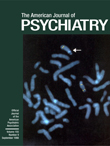Vulnerability to Posttraumatic Stress Disorder in Adult Offspring of Holocaust Survivors
Abstract
Objective: There has been considerable controversy regarding the impact of the Holocaust on the second generation, but few empirical data are available that systematically document trauma exposure and psychiatric disorder in these individuals. To obtain such data, the authors examined the prevalence of stress and exposure to trauma, current and lifetime posttraumatic stress disorder (PTSD), and other psychiatric diagnoses in a group of adult offspring of Holocaust survivors (N=100) and a demographically similar comparison group (N=44).Method: Subjects were recruited from both community and clinical populations and were evaluated with the use of structured clinical instruments. Stress and trauma history were evaluated with the Antonovsky Life Crises Scale and the Trauma History Questionnaire, PTSD was diagnosed with the Clinician Administered PTSD Scale, and other psychiatric disorders were evaluated according to the Structured Clinical Interview for DSM-IV. Results: The data show that although adult offspring of Holocaust survivors did not experience more traumatic events, they had a greater prevalence of current and lifetime PTSD and other psychiatric diagnoses than the demographically similar comparison subjects. This was true in both community and clinical subjects.Conclusions: The findings demonstrate an increased vulnerability to PTSD and other psychiatric disorders among offspring of Holocaust survivors, thus identifying adult offspring as a possible high-risk group within which to explore the individual differences that constitute risk factors for PTSD. Am J Psychiatry 1998; 155: 1163-1171



